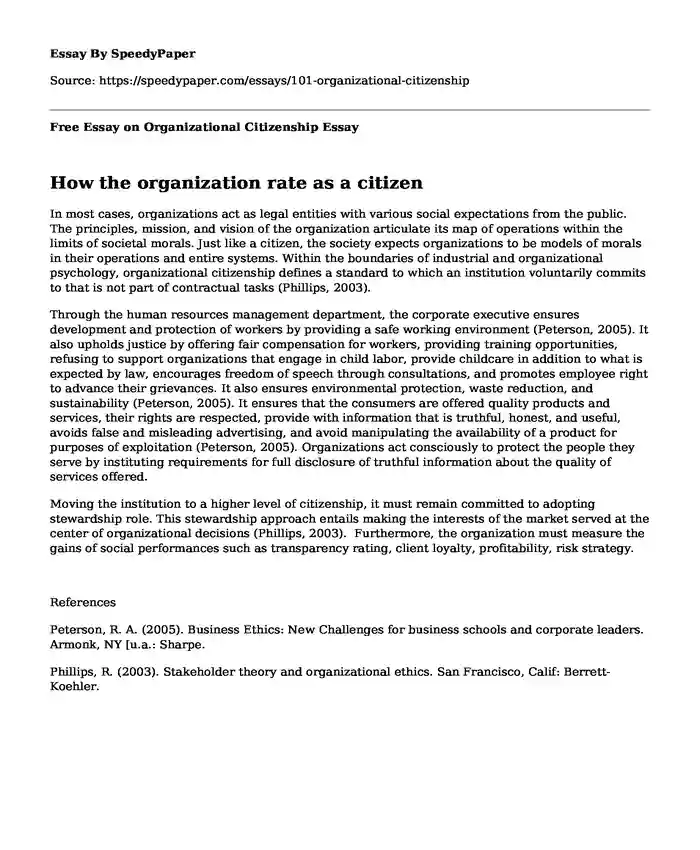
| Type of paper: | Essay |
| Categories: | Human resources Organizational behavior |
| Pages: | 2 |
| Wordcount: | 320 words |
How the organization rate as a citizen
In most cases, organizations act as legal entities with various social expectations from the public. The principles, mission, and vision of the organization articulate its map of operations within the limits of societal morals. Just like a citizen, the society expects organizations to be models of morals in their operations and entire systems. Within the boundaries of industrial and organizational psychology, organizational citizenship defines a standard to which an institution voluntarily commits to that is not part of contractual tasks (Phillips, 2003).
Through the human resources management department, the corporate executive ensures development and protection of workers by providing a safe working environment (Peterson, 2005). It also upholds justice by offering fair compensation for workers, providing training opportunities, refusing to support organizations that engage in child labor, provide childcare in addition to what is expected by law, encourages freedom of speech through consultations, and promotes employee right to advance their grievances. It also ensures environmental protection, waste reduction, and sustainability (Peterson, 2005). It ensures that the consumers are offered quality products and services, their rights are respected, provide with information that is truthful, honest, and useful, avoids false and misleading advertising, and avoid manipulating the availability of a product for purposes of exploitation (Peterson, 2005). Organizations act consciously to protect the people they serve by instituting requirements for full disclosure of truthful information about the quality of services offered.
Moving the institution to a higher level of citizenship, it must remain committed to adopting stewardship role. This stewardship approach entails making the interests of the market served at the center of organizational decisions (Phillips, 2003). Furthermore, the organization must measure the gains of social performances such as transparency rating, client loyalty, profitability, risk strategy.
References
Peterson, R. A. (2005). Business Ethics: New Challenges for business schools and corporate leaders. Armonk, NY [u.a.: Sharpe.
Phillips, R. (2003). Stakeholder theory and organizational ethics. San Francisco, Calif: Berrett- Koehler.
Cite this page
Free Essay on Organizational Citizenship. (2019, Jan 29). Retrieved from https://speedypaper.com/essays/101-organizational-citizenship
Request Removal
If you are the original author of this essay and no longer wish to have it published on the SpeedyPaper website, please click below to request its removal:
- Diet Analysis Essay Example
- Talking To Grief By Denise Levertov: Essay Sample to Check
- Essay Sample Analyzing the Failure of the REACH Project
- Free Essay on Economics of Regulation and the Coase Theorem
- Free Essay: Ethical Dimensions of Research Studies
- Revised Research Question: Non-native Accents and Stigma
- Inflation, Unemployment, and Growth in Pakistan, Free Essay in Economics
Popular categories




